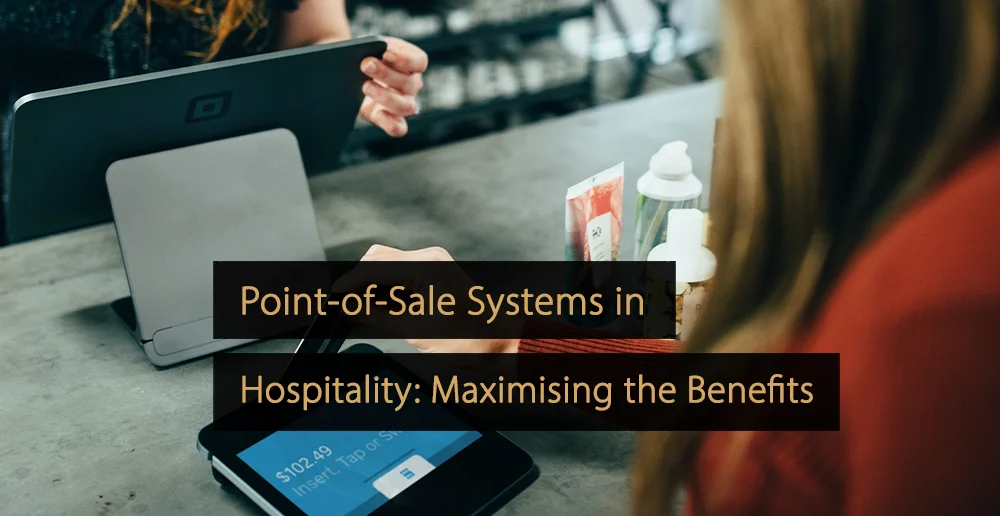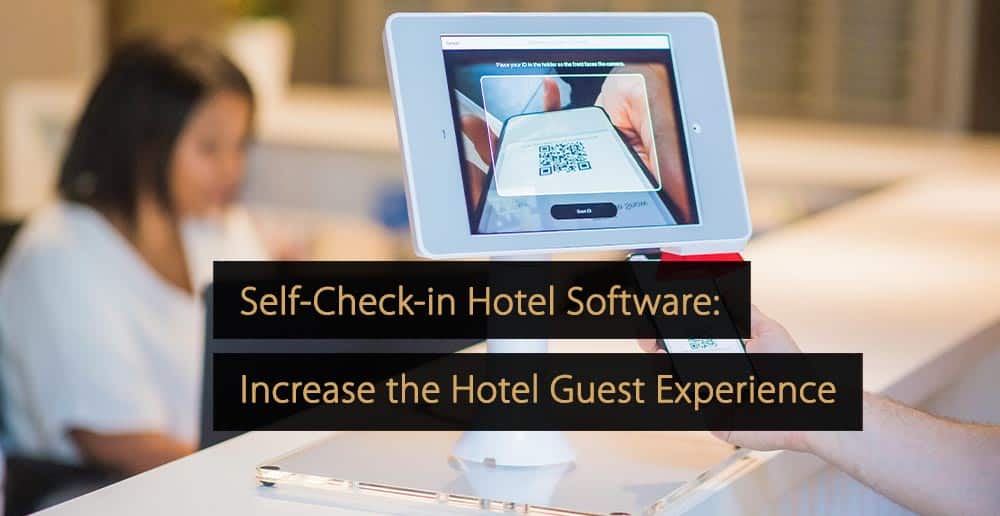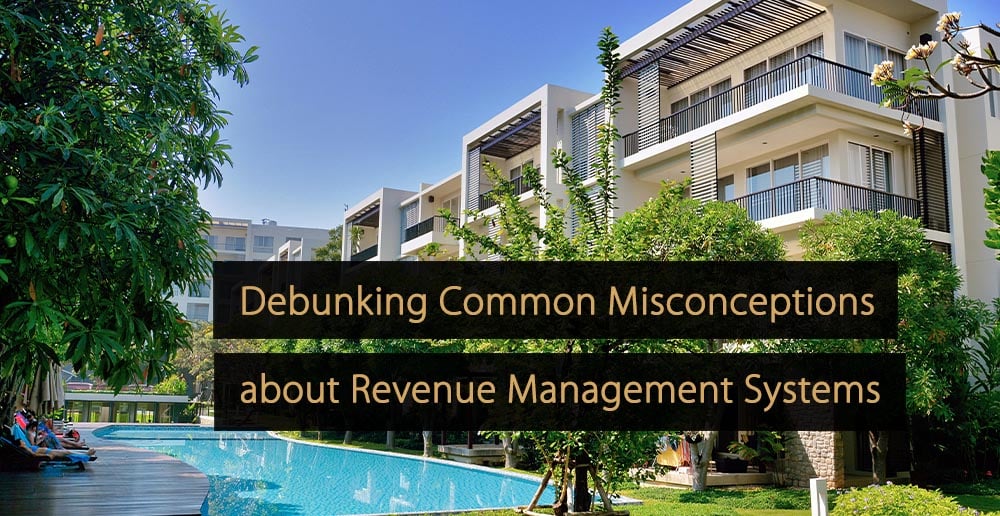Point-of-sale systems serve a crucial role in the hospitality industry, assisting with everything from the processing of customer payments to the accurate collection and management of data. Nevertheless, businesses need to take certain steps to maximize the benefits, and in this post, you can learn more about these steps.
Table of Contents:
- What is a Point-of-Sale System?
- What Are the Main Benefits of Point-of-Sale Systems?
- 5 Additional Benefits of Point-of-Sale Systems?
- An Overview of Point-of-Sale Systems in Hospitality
- Benefits of Point-of-Sale Systems for Hotels
- Reporting Features of Point-of-Sale Systems in Hospitality
- Point-of-Sale Systems: Key Trends for Restaurants
- Point-of-Sale Systems: How to Pick the Right App
What is a Point-of-Sale System?
A point-of-sale system, or POS system for short, can be described as a computerized system that businesses can use to process payments, track sales information, collect and manage associated data, and much more. These systems are controlled through POS software installed on various compatible devices.
Video: What is a POS System?
Although the systems are primarily associated with sales and payment processing, they also serve several extra functions, allowing businesses and employees to monitor performance, develop customer loyalty programs, create reports, and a whole lot more. In this sense, they can be seen as multi-purpose hospitality technology.
What Are the Main Benefits of Point-of-Sale Systems?
Several benefits are associated with using a point-of-sale system within hospitality, including improved payment processing, faster access to information, and more convenient service for customers, ultimately resulting in an improved guest experience in hotels, restaurants, and other similar settings.
That said, the uses for those involved in hospitality management extend further. For instance, using a point-of-sale service to collect sales data can help improve accuracy and eliminate much of the human error linked to manual data collection. POS systems can also assist with data analytics and visualization, giving you a better sense of where your business currently stands and what you can expect.
5 Additional Benefits of Point-of-Sale Systems?
In addition to these core benefits, there are several further ways that point-of-sale systems can benefit those in hotel, bar, nightclub, or restaurant management, and fully realizing these benefits will enable you to maximize your POS system and achieve the highest possible return on investment. These benefits include the ability to:
1. Expand Your Business
A high-quality point-of-sale system can be seen as a highly advanced piece of hotel, bar, or restaurant technology, helping you to improve the customer experience. As your reputation grows and your business results improve, you can also use the technology to start to think about expanding your business beyond its current limitations.
For example, a POS system within a restaurant can be integrated with your website, allowing you to take online orders and expand into a dine-in and takeaway service. Alternatively, you can add new elements within hotels, such as a restaurant, a bar, a gift shop, or function rooms, and allow guests to pay in those locations at the moment.
These payments can be processed using mobile devices, such as smartphones, tablets, iPads, or similar accessories, allowing guests to pay conveniently. In contrast, the payments are automatically synchronized with wider company sales data. Many of the managerial tasks associated with expanding a business in this way can be automated, making it a more realistic prospect for businesses in different financial situations.
2. Upsell Current Products and Packages
Another way that those involved in running hotels and other hospitality businesses can maximize the benefits of their point-of-sale system is to use it to enhance upselling and cross-selling efforts. On a basic level, the POS system can also help track which employees are successfully upselling and cross-selling.
This can be used strategically to create friendly competition between employees, with rewards for the top performers. As a result, upselling and cross-selling are incentivized, and performance is tracked automatically.
However, going further, a POS system can be integrated with an online booking engine to make intelligent recommendations at the right moment to maximize sales. The system can be integrated within restaurants with a self-service kiosk, recommending regular side dishes with what the customer has ordered.
In bars and nightclubs, special offers can be added to the POS system, making them easier for staff to process, and this then makes the employees more likely to highlight these offers to customers when they buy. Additionally, POS systems can create customer loyalty schemes, assisting with upselling and cross-selling attempts.
3. Train Staff to Maximize Customer Satisfaction
To maximize the benefits of point-of-sale systems within hospitality, businesses need to provide the right level of training with a focus on customer satisfaction. A good way to think about this is as follows: to get the most from POS systems, businesses should ensure that customers get the greatest possible benefit too.
Once employees are sufficiently trained, they will understand how to use POS software to improve the experience for customers or guests. For example, upselling and cross-selling can become second nature and can be integrated into a front desk or customer service processes, while knowing how to access customer data can improve efficiency.
The customer data that can be captured by POS systems, or integrated with the systems, can also help to provide a much greater level of personalization. This can be critical for providing customers with a unique experience where they feel valued as an individual and where your offerings are tailored to their needs.
4. Customize Your POS System to Fit Your Needs and Branding
In many cases, modern point-of-sale systems and the software that powers them can be set up in ways that allow them to fit your needs and your branding strategy better. However, this may involve making the right initial software choice, which is why it can be important to opt for solutions that allow customization.
Including branding within the software can be useful for building a greater sense of belonging and reminding employees of your business’s core values. This can also be important for customers because it can ensure receipts and other payment-related documents have your business name and logo displayed.
Automation through a POS system can allow messages or orders to be sent to customers, employees, and business partners at the right time. Branding can then provide these automated forms of communication with a personal touch.
However, you can take this level of customization further by ensuring the POS system and its software are fully integrated with other business processes. For example, the POS system can be integrated with your sales data to keep it updated, and logging in to the system can be connected to your payroll processes.
The greater the level of integration with wider processes, the more effective you will be in turning your POS system into a tool that feels unique to your hotel, restaurant, cafe, bar, or nightclub.
5. Adapt to the New Post-Pandemic Reality
Many sections of the hospitality industry, with hotels being a particularly strong example, have had to find alternative means of generating money due to the COVID-19 pandemic and associated restrictions.
A well-designed point-of-sale system, which offers a degree of flexibility, and which allows new revenue sources and physical payment areas to be added to a hotel, can be vital for helping your business to continue with some of these new revenue sources and adapt to the new post-pandemic reality, with travel and tourism picking up again.
For instance, some hotels have branched into areas like food delivery to supplement their income. Suppose this applies to your property, and you want to continue offering this service. In that case, your POS system must facilitate online ordering while serving the more traditional hotel functions.
Your point-of-sale system and the associated devices can also play a key role in ensuring customers or guests feel safe. For example, iPads and other tablets can be used to process contactless payments in restaurants at the table, or customers could be given the option to pay using an app, which can help maintain social distancing.
An Overview of Point-of-Sale Systems in Hospitality
For those in the hospitality industry, understanding point-of-sale systems and software can be critical to achieving lasting success. In particular, business leaders need to know how they work, their potential, and why they are important in modern hotels, restaurants, and similar settings.
To find out more and access insights about the true value of these systems within the hospitality sector, read the “POS Systems: Overview and Importance in The Hospitality Industry” article.
Benefits of Point-of-Sale Systems for Hotels
Point-of-sale systems can benefit hospitality businesses of all kinds. Still, they have particular uses for those operating within the hotel industry because of the data hotels deal with and the variety of services they tend to provide aside from the simple sale of hotel rooms.
To learn more about how a POS system can benefit your hotel business, complete with specific examples, look at the “6 Benefits of Point-of-Sale Software for Hotels” article.
Reporting Features of Point-of-Sale Systems in Hospitality
Point-of-sale systems have several uses away from the core applications, like processing card and cash payments from customers. A good example of this is their role in assisting businesses with creating accurate and useful reports, including performance reports, employee reports, and more.
If you want to improve your understanding of the reporting features available when using your POS software, check out our “A Deep-Dive into Reporting Features of POS Software for Hospitality” post.
Point-of-Sale Systems: Key Trends for Restaurants
Within the restaurant industry, point-of-sale systems are critical to success, but different restaurants also have different uses for the software. To get the most from your POS system, it is recommended to always stay up-to-date with emerging trends and be as informed as possible about what the future will likely bring.
To explore point-of-sale system trends for restaurants in greater depth and learn about the main trends to be aware of, read the “Restaurant POS Systems: The Latest and Future Trends” article.
Point-of-Sale Systems: How to Pick the Right App
To maximize your point-of-sale system, it is important to select the right app. After all, your chosen software will serve as the system’s front-end and be used by employees to process payments and carry out other tasks. That said, selecting the right app also requires an awareness of what to look for.
If you hope to find useful advice on what to look out for when browsing the different software options on the market, check out our “POS Apps: How to Choose the Right One?” article.
Point-of-sale systems can play a fundamental role in business success within the hospitality industry, but hotels, restaurants, and other companies need to understand how to maximize the benefits. This can be achieved by training staff to focus on customer satisfaction, customizing your setup, and using POS systems to expand.
More Tips to Grow Your Business
Revfine.com is the leading knowledge platform for the hospitality and travel industry. Professionals use our insights, strategies, and actionable tips to get inspired, optimize revenue, innovate processes, and improve customer experience.Explore expert advice on management, marketing, revenue management, operations, software, and technology in our dedicated Hotel, Hospitality, and Travel & Tourism categories.








Thank you for the informative information about Point-of-Sale Systems.